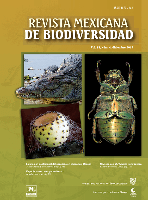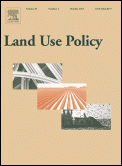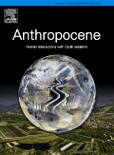
Regional Environmental Change
Scope & Guideline
Transforming Research into Action for Regional Resilience
Introduction
Aims and Scopes
- Interdisciplinary Research on Environmental Change:
The journal publishes interdisciplinary studies that integrate natural and social sciences to address the complexities of environmental change and its impacts on regional systems. - Regional Adaptation Strategies:
Research on local and regional strategies for adapting to environmental changes, emphasizing community-based approaches and indigenous knowledge. - Land Use and Ecosystem Dynamics:
Focus on the analysis of land use changes and their implications for ecosystems, biodiversity, and human livelihoods, including the effects of agricultural practices, urbanization, and deforestation. - Climate Change Impacts and Mitigation:
Investigations into the impacts of climate change on various ecosystems and communities, along with studies on mitigation strategies and resilience building. - Sustainable Resource Management:
Exploration of sustainable practices in resource management, including water use, agriculture, and biodiversity conservation, aimed at enhancing ecological health and community resilience.
Trending and Emerging
- Climate Migration and Mobility:
An increasing number of studies are exploring the dynamics of climate-induced migration, addressing how communities adapt or relocate in response to environmental changes. - Community Resilience and Adaptation:
Research focusing on community resilience and adaptation strategies is on the rise, emphasizing participatory approaches and local knowledge in building adaptive capacities. - Socio-Ecological Systems and Governance:
Emerging research is delving into the governance of socio-ecological systems, analyzing how policies and institutional frameworks can better support sustainable practices and resilience. - Impact of Extreme Weather Events:
There is a growing emphasis on understanding the impacts of extreme weather events on ecosystems and human communities, particularly in the context of climate change. - Nature-Based Solutions:
Research exploring nature-based solutions for climate adaptation and mitigation is gaining traction, highlighting the potential of ecosystem services to address environmental challenges.
Declining or Waning
- Traditional Agricultural Practices:
Research on traditional agricultural practices and their impacts on the environment has decreased, possibly overshadowed by studies focusing on modern, sustainable, and climate-smart agriculture. - Historical Land Use Analysis:
While historical land use studies were once prevalent, there seems to be a waning interest, as more researchers focus on current and future scenarios rather than retrospective analyses. - Biodiversity Loss in Non-Agricultural Landscapes:
There has been less focus on biodiversity loss in non-agricultural landscapes, as attention shifts to agricultural biodiversity and its role in food security. - Local Ecological Knowledge:
Though still important, the emphasis on local ecological knowledge has diminished in favor of more quantitative, data-driven approaches to environmental research.
Similar Journals

Revista Mexicana de Biodiversidad
Championing Conservation through Innovative ResearchRevista Mexicana de Biodiversidad is a prominent academic journal dedicated to the field of biodiversity and conservation, published by the prestigious Instituto de Biología, Universidad Nacional Autónoma de México. Since its inception as an Open Access publication in 2005, it has aimed to disseminate high-quality research that advances the understanding of biological diversity in Mexico and beyond. With an ISSN of 1870-3453 and an E-ISSN of 2007-8706, the journal caters to a diverse audience, including researchers, professionals, and students, by providing vital insights into ecological studies, conservation strategies, and the sustainable management of natural resources. The journal is committed to fostering scientific collaboration and promoting the significance of biodiversity in addressing contemporary environmental challenges. By publishing innovative and impactful research, the Revista Mexicana de Biodiversidad plays an essential role in the global discourse on biodiversity conservation.

Letters in Spatial and Resource Sciences
Unraveling Complexities in Spatial DynamicsLetters in Spatial and Resource Sciences, published by Springer Heidelberg, is a prestigious journal dedicated to the interdisciplinary exploration of spatial and resource-related issues within the fields of demography, economics, geography, planning, and urban studies. Since its inception in 2008, this journal has provided a platform for cutting-edge research, facilitating the exchange of innovative ideas and methodologies that address contemporary challenges in spatial dynamics and resource allocation. With an impact factor reflecting its robust standing in academic circles (notably ranking Q2 in Demography and Geography, and Q3 in Economics and Econometrics as of 2023), it serves as an essential resource for scholars and practitioners alike. The journal is committed to fostering open dialogue and advancing the understanding of spatial phenomena, making it a vital asset for anyone engaged in these dynamic areas of study. Targeting a diverse audience, from researchers to industry professionals, it aims to enhance scholarly communication and promote evidence-based solutions to spatial and resource dilemmas.

Trees Forests and People
Advancing Knowledge for Sustainable Forest ManagementTrees, Forests and People is an esteemed peer-reviewed journal published by Elsevier that commenced its journey in 2020 and focuses on the intricate relationships between trees, forests, and human communities. With its E-ISSN of 2666-7193, this journal serves as a vital platform for presenting cutting-edge research in disciplines such as forestry, environmental science, and management. Recognized for its impact within the academic community, it has achieved a prestigious Q1 ranking in both Economics, Econometrics and Finance (Miscellaneous) and Forestry, alongside a Q2 ranking in Management, Monitoring, Policy and Law as of 2023. Its Scopus rankings indicate robust positioning in various fields, appealing to a diverse audience of researchers, professionals, and policy-makers engaged in sustainable forest management and ecosystem services. By offering open access options, the journal ensures that critical findings are readily available to a global audience, fostering knowledge sharing and collaborative efforts aimed at addressing the pressing challenges in forest conservation and management.

EARTH is a prestigious journal published by MDPI, located in Switzerland, with a commitment to advancing the fields of Earth and Planetary Sciences and Environmental Science. Launched in 2020, the journal emphasizes an open-access publication model, ensuring that high-quality research is widely accessible to the scientific community and beyond. As of 2023, it proudly holds a Q2 ranking in both the Environmental Science and Earth and Planetary Sciences categories, indicating its significant impact within these disciplines; it ranks #90 out of 219 and #70 out of 159 in their respective fields according to Scopus. With the convergence of multidisciplinary research and the critical challenges our planet faces, EARTH seeks to publish innovative studies that foster a deeper understanding of geological and environmental processes. Researchers, professionals, and students alike will find this journal an invaluable resource for the latest findings and discussions shaping our understanding of Earth sciences.

Geography and Natural Resources
Navigating the Intersections of Geography and ResourcesGeography and Natural Resources is a vital academic journal published by MAIK NAUKA/INTERPERIODICA/SPRINGER, focusing on diverse aspects of geography, natural resource management, and environmental sciences. With its ISSN 1875-3728 and E-ISSN 1875-371X, the journal serves as a platform for scholars and researchers to disseminate their findings in a rapidly evolving field. The journal holds a respectable Q3 ranking in the categories of Earth-Surface Processes and Geography, Planning and Development, as well as a Q4 ranking in Management, Monitoring, Policy, and Law, reflecting its commitment to quality research. Although it is not an open-access journal, it offers valuable insights and impactful articles tailored for professionals and academics interested in the intersection of human and environmental systems. By bridging theoretical and practical applications, Geography and Natural Resources plays a crucial role in guiding policies and enhancing understanding of sustainable development from 2008 to 2024 and beyond, making it an indispensable resource for the global scholarly community.

Present Environment and Sustainable Development
Exploring the nexus of ecology, policy, and socio-economics.Present Environment and Sustainable Development, published by ALEXANDRU IOAN CUZA UNIVERSITY PRESS, is a prominent open-access journal dedicated to advancing knowledge in the field of environmental science and sustainable development. Since its inception in 2014, the journal has provided a platform for researchers, professionals, and students to disseminate transformative ideas and innovative research aimed at addressing crucial environmental challenges. With its ISSN 1843-5971 and E-ISSN 2284-7820, it emphasizes the necessity of sustainable practices in contemporary society, facilitating interdisciplinary approaches that unite various fields, including ecology, policy, and socio-economic studies. Based in Iasi, Romania, this journal plays a vital role in fostering international collaboration and dialogue on sustainability, making it an essential resource for anyone committed to understanding and improving the environment for future generations.

LAND USE POLICY
Transforming Land Use Through Research and PolicyLAND USE POLICY, published by ELSEVIER SCI LTD, is a premier academic journal dedicated to advancing the study of land use issues and policies, with a particular focus on sustainable management and conservation practices. Since its inception in 1984, this journal has established itself as an influential platform in the fields of Forestry, Geography, Planning and Development, and Environmental Science, consistently achieving a Q1 category ranking across various disciplines. With an impressive impact factor and recognition as a top-tier source (e.g., ranking #18/821 in Geography and Planning), it serves as a critical resource for researchers, practitioners, and policy-makers looking to address complex land use challenges. Although it does not offer open access, the journal's articles are widely accessible through institutional subscriptions, enhancing its reach. Researchers and students can find valuable insights into innovative policies and methodologies that promote sustainable land management, making LAND USE POLICY essential reading for anyone engaged in environmental studies and policy development.

Ecological Indicators
Advancing ecological knowledge for a sustainable future.Ecological Indicators, published by Elsevier, is a prestigious journal dedicated to advancing the fields of ecology and environmental science. With an impressive impact factor and ranked in the Q1 quartile for both Ecology and Decision Sciences categories, the journal serves as a vital resource for researchers and professionals aiming to apply ecological knowledge to real-world problems. The journal covers a broad scope of topics within ecological indicators, aiming to provide comprehensive insights into biodiversity, ecosystem health, and sustainability metrics. Founded in 2001 and continuing through 2024, Ecological Indicators has established itself as a leader in disseminating significant research and innovative findings. The journal's standing is reflected in its remarkable Scopus ranks, placing it among the top percentile in its respective categories. Authors are encouraged to submit their work to share vital findings with an engaged audience of researchers, professionals, and dedicated students, ensuring the continued relevance and impact of ecological research on global environmental policies and practices.

Anthropocene
Bridging Disciplines to Tackle Ecological IssuesAnthropocene, published by Elsevier Science Ltd, is a leading journal dedicated to the interdisciplinary study of the Anthropocene epoch, focusing on the profound impacts of human activity on Earth systems and ecosystems. With an impressive impact factor reflected in its Q1 rankings in Earth and Planetary Sciences and Ecology, as well as a solid standing in Global and Planetary Change, this journal is a vital resource for researchers, professionals, and students striving to understand and address the pressing environmental challenges of our time. Since its inception in 2013, the journal has been committed to publishing high-quality, peer-reviewed articles that stimulate critical discourse and inspire innovative solutions to complex ecological issues. Although not an open-access journal, Anthropocene provides extensive access options through institutional subscriptions, making its significant research readily available to the academic community. Based in the United Kingdom, the journal serves as a cornerstone for scholarship in a rapidly evolving field, bridging gaps across disciplines and encouraging interdisciplinary collaboration for a sustainable future.

Geographica Pannonica
Unveiling Insights into Earth and SocietyGeographica Pannonica is a premier, open-access journal dedicated to the various dimensions of geography, atmospheric sciences, geology, and related fields. Published by the University of Novi Sad's Faculty of Natural Sciences and Mathematics, this Serbian journal has been a vital platform for scholarly discourse since its inception, with an open-access policy established in 2010 to enhance the dissemination of research findings. Covering a spectrum of topics from Earth-surface processes to tourism management, the journal has achieved notable rankings, reflecting its commitment to impactful research—ranking in the Q3 quartile across multiple categories in 2023. Researchers, professionals, and students are encouraged to engage with the latest articles that contribute to advancing our understanding of geographical phenomena and sustainability challenges, making Geographica Pannonica an essential resource for the global academic community.